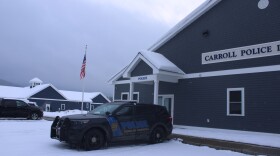This story was originally produced by the Valley News. NHPR is republishing it in partnership with the Granite State News Collaborative.
The item that prompted the most discussion at the annual Hanover Town Meeting on Tuesday night was an article brought by petition calling on the town manager and police chief not to enter any agreements with U.S. Immigration and Customs Enforcement, or ICE.
Pamela Salmon, who said she has spent her life as an English as a second language teacher helping children who come to the U.S. from other countries, became emotional while speaking in favor of the article during the floor portion of the meeting at Hanover High School.
She said she currently works with a Nicaraguan family whose children are afraid to go to school “because they don’t know when they come home if their parent is going to be there,” Salmon said.
“We have to stand up against this brutality, we have to, we really have to,” Salmon said. “For our children’s sake, for the children of the world.”
One of the few people to speak against the article was Hanover resident Jim Bullion, who said he has family members who came to the United States as legal immigrants and “they were welcomed here.”
He argued that ICE “exists to fulfill the laws of this country.”
The majority of the approximately 200 voters at Tuesday’s in-person meeting did not find Bullion’s argument convincing. They approved the ICE-related article, as well as everything else on the warrant, including a $32.8 million operating budget. (The ICE article is No. 23 on the town warrant.)
At the polls on Tuesday, Hanover voters also approved two changes to the zoning code to encourage housing development in Hanover and reelected the incumbent to the Selectboard.
Of the roughly 8,800 registered voters in Hanover, 1,296 cast ballots Tuesday, for turnout of about 15%.
In the only floor vote that was close enough to go from a voice vote to a showing of paper slips, residents approved creating a remote participation option for Selectboard meetings.
Previously, Selectboard meetings in Hanover have been broadcast by Junction Arts and Media, but there was no way to take part remotely.
In a third petitioned article, residents approved updating the town’s charter and official documents to be more gender-inclusive by removing terms such as “selectmen.”
Athos Rassias, 63, who has served nearly two decades on the Selectboard beat out Dartmouth student Evan Gerson, 916-259, in ballot voting Tuesday. Rassias will serve another three-year term.
“I greatly appreciate the support from the community and I will continue to do my best to serve the town,” Rassias said via email Wednesday.
Though Gerson, 20, did not win the seat, in a text message after the meeting, he expressed his enthusiasm that the first of three zoning articles had passed.
“This is truly a game-changer for making Hanover a town affordable for people of all economic means, inclusive to everyone,” Gerson texted
Voters’ approval will allow for the creation of a “house-scale residential dwelling overlay district,” where multi-unit residences the size of houses — such as duplexes, triplexes, fourplexes, courtyard buildings and townhouse — can be built in districts served by town water and sewer.
The amendment will make it easier to build smaller multi-unit developments in Hanover instead of single-family homes to meet housing needs that serve a variety of populations while also matching with existing neighborhoods.
In the weeks and months leading up to the meeting, residents expressed mixed feelings about this zoning amendment.
This was reflected in the relatively close result of 703 to 575.
Outside of Hanover High School, which was the site of the floor meeting and the polling place, some opponents displayed signs encouraging a no-vote.
The signs called on the town to “take time to refine” the article and suggested that it would not meet the presented goals such as fitting into existing neighborhoods and making more affordable housing available.
The second zoning amendment, which passed 748 to 525, will make it easier for nonprofits to build affordable workforce housing in zones where it is already allowed. Nonprofits no longer have to receive a special exception to the zoning code for this type of project.
Residents also approved a third amendment to the zoning code to allow more signs directing people around the Dartmouth College campus.







